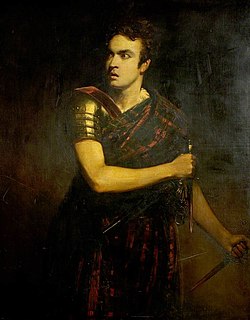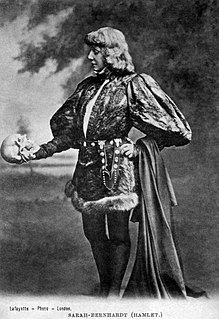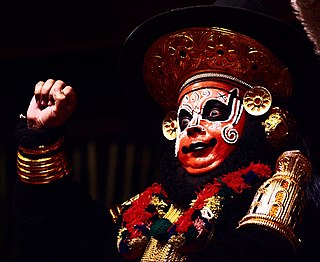Related Research Articles

Macbeth, fully The Tragedy of Macbeth, is a tragedy by William Shakespeare. It was probably first performed in 1606. It was first published in the Folio of 1623, possibly from a prompt book, and is Shakespeare's shortest tragedy.
The classical unities, Aristotelian unities, or three unities represent a prescriptive theory of dramatic tragedy that was introduced in Italy in the 16th century and was influential for three centuries. The three unities are:
- unity of action: a tragedy should have one principal action.
- unity of time: the action in a tragedy should occur over a period of no more than 24 hours.
- unity of place: a tragedy should exist in a single physical location.

William Shakespeare was an English playwright, poet, and actor, widely regarded as the greatest writer in the English language and the world's greatest dramatist. He is often called England's national poet and the "Bard of Avon". His extant works, including collaborations, consist of some 39 plays, 154 sonnets, three long narrative poems, and a few other verses, some of uncertain authorship. His plays have been translated into every major living language and are performed more often than those of any other playwright. They also continue to be studied and reinterpreted.

Tragedy is a form of drama based on human suffering and, mainly, the terrible or sorrowful events that befall a main character. Traditionally, the intention of tragedy is to invoke an accompanying catharsis, or a "pain [that] awakens pleasure", for the audience. While many cultures have developed forms that provoke this paradoxical response, the term tragedy often refers to a specific tradition of drama that has played a unique and important role historically in the self-definition of Western civilization. That tradition has been multiple and discontinuous, yet the term has often been used to invoke a powerful effect of cultural identity and historical continuity—"the Greeks and the Elizabethans, in one cultural form; Hellenes and Christians, in a common activity," as Raymond Williams puts it.
This article contains information about the literary events and publications of 1696.
Thomas Nabbes was an English dramatist.
Richard Knolles was an English historian, famous for his account of the Ottoman Empire, the first major description in the English language.

Ancient Greek drama was a theatrical culture that flourished in ancient Greece from 600 BC. The city-state of Athens, which became a significant cultural, political, and religious place during this period, was its centre, where the theatre was institutionalised as part of a festival called the Dionysia, which honoured the god Dionysus. Tragedy, comedy, and the satyr play were the three dramatic genres to emerge there. Athens exported the festival to its numerous colonies.
Thomas Goffe (1591–1629) was a minor Jacobean dramatist.

William Whitehead was an English poet and playwright. He became Poet Laureate in December 1757 after Thomas Gray declined the position.

Stephen Phillips was an English poet and dramatist, who enjoyed considerable popularity early in his career.

Pan-Turkism is a political movement which emerged during the 1880s among Turkic intellectuals of the Russian region of Shirvan and the Ottoman Empire, with its aim being the cultural and political unification of all Turkic peoples. Turanism is a closely related movement but a more general term than Turkism, since Turkism applies only to Turkic peoples. However, researchers and politicians steeped in Turkic ideology have used these terms interchangeably in many sources and works of literature. Although many of the Turkic peoples share historical, cultural and linguistic roots, the rise of a pan-Turkic political movement is a phenomenon of the 19th and 20th centuries. It was in part a response to the development of Pan-Slavism and Pan-Germanism in Europe, and influenced Pan-Iranism in Asia. Ziya Gökalp defined pan-Turkism as a cultural, academic, and philosophical and political concept advocating the unity of Turkic peoples. Ideologically, it was premised on social Darwinism.

The Theatre of Dionysus is an ancient Greek theatre in Athens. It is built on the south slope of the Akropolis hill,originally part of the sanctuary of Dionysos Eleuthereus. The first orchestra terrace was constructed on the site around the mid- to late-sixth century BC, where it hosted the City Dionysia. The theatre reached its fullest extent in the fourth century BC under the epistates of Lycurgus when it would have had a capacity of up to 17,000, and was in continuous use down to the Roman period. The theatre then fell into decay in the Byzantine era and was not identified, excavated and restored to its current condition until the nineteenth century.
Alparslan Türkeş was a Turkish politician, who was the founder and president of the Nationalist Movement Party. He represented the far-right of the Turkish political spectrum. He was and still is called Başbuğ ("Leader") by his devotees. Although his ideology was on the far-right, he is respected by nationalists on both sides of the Turkish political spectrum.

Drama is the specific mode of fiction represented in performance: a play, opera, mime, ballet, etc., performed in a theatre, or on radio or television. Considered as a genre of poetry in general, the dramatic mode has been contrasted with the epic and the lyrical modes ever since Aristotle's Poetics —the earliest work of dramatic theory.

Theatre or theater is a collaborative form of performing art that uses live performers, usually actors or actresses, to present the experience of a real or imagined event before a live audience in a specific place, often a stage. The performers may communicate this experience to the audience through combinations of gesture, speech, song, music, and dance. Elements of art, such as painted scenery and stagecraft such as lighting are used to enhance the physicality, presence and immediacy of the experience. The specific place of the performance is also named by the word "theatre" as derived from the Ancient Greek θέατρον, itself from θεάομαι.

The history of theatre charts the development of theatre over the past 2,500 years. While performative elements are present in every society, it is customary to acknowledge a distinction between theatre as an art form and entertainment and theatrical or performative elements in other activities. The history of theatre is primarily concerned with the origin and subsequent development of the theatre as an autonomous activity. Since classical Athens in the 6th century BC, vibrant traditions of theatre have flourished in cultures across the world.
Frank W. Wadsworth was an American Shakespearean scholar, author, and sportsman.
Idealism is the name of Alparslan Türkeş and the Nationalist Movement Party lines, as a principle of the Nine Lights Doctrine.
An Excellent Tragedy of Mulleasses the Turke, and Borgias Governour of Florence, commonly referred to as The Turk is Jacobean revenge tragedy by John Mason first published in 1610.
References
- ↑ Adams, Jr., Joseph Quincy (1913-01-01). "Introduction". John Mason's The Turke. Louvain. hdl:2027/njp.32101068584364.
- ↑ Glynne Wickham; Herbert Berry (2000). English Professional Theatre, 1530-1660. Cambridge University Press. p. 547. ISBN 978-0-521-23012-4.